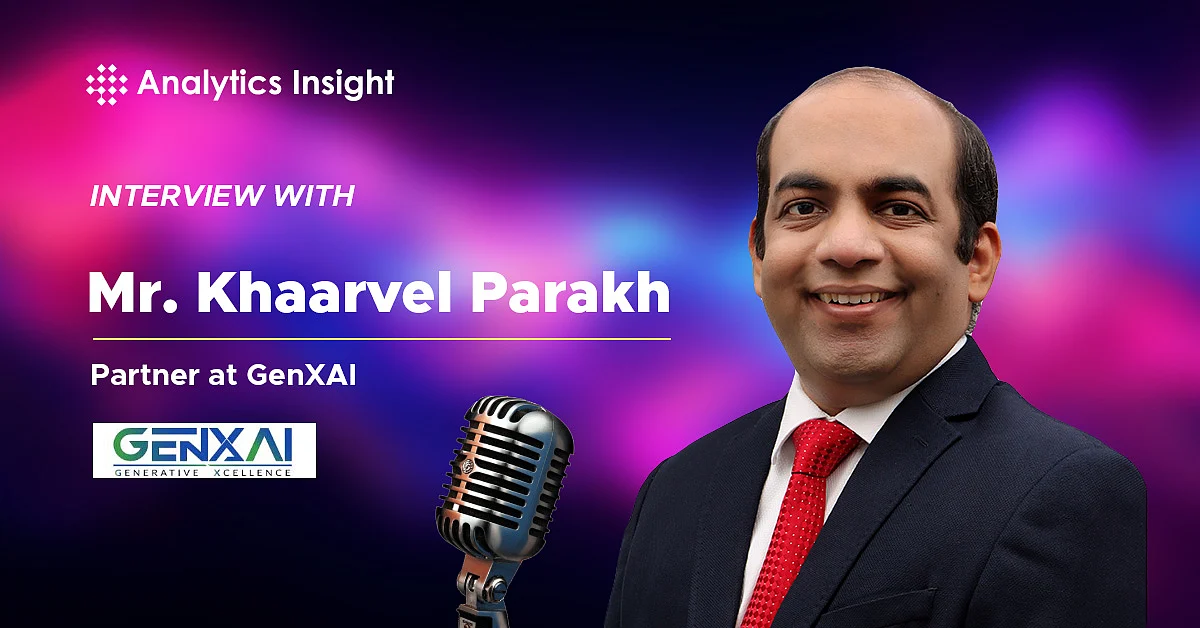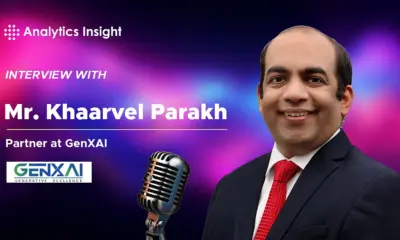Technology
AI Transformation Accelerates: Insights from GenXAI’s Khaarvel Parakh

The landscape of artificial intelligence (AI) is evolving rapidly, shaping how modern enterprises operate. During a recent episode of the **Analytics Insight** podcast, host **Priya Dialani** engaged in a thought-provoking discussion with **Khaarvel Parakh**, Partner at **GenXAI**, about the challenges and opportunities of AI transformation in today’s business environment. The conversation highlighted a crucial gap: while many organizations possess advanced tools, they often grapple with slow processes and disconnected systems.
Understanding the AI Transformation Challenge
Khaarvel Parakh emphasized that the current phase of AI transformation is not merely about adopting new technologies. It is about redefining workflows and enhancing efficiency. Despite having access to modern tools, many enterprises continue to face issues such as tedious processes and repetitive tasks. Parakh pointed out that this disconnect is where AI transformation can act as a catalyst, fundamentally altering how work is executed.
GenXAI, which has spent over **14 years** addressing complex technology and planning challenges, recently rebranded to better reflect its commitment to an AI-first approach. Parakh noted that the company is dedicated to leading in enterprise performance management while expanding its offerings to include generative AI solutions, custom software development, and IoT-driven systems. Their initiatives also encompass government projects focused on sustainability, underscoring a commitment to responsible innovation.
Khaarvel Parakh’s Journey and Leadership
Reflecting on his **15-year** career, Khaarvel Parakh shared insights into his diverse background in consulting, large firms, and his own tech startup before joining GenXAI five years ago. At that time, GenXAI was a burgeoning startup focused on finance, supply chain, and strategic planning solutions. Today, Parakh leads the development of solutions that help executives understand their challenges while designing technology that anticipates future needs.
His role is pivotal in creating systems that integrate processes, people, and advanced tools, ensuring they work together effectively. This holistic approach is essential for organizations aiming to navigate the complexities of modern business environments.
Throughout the podcast, Parakh discussed how AI is transforming planning and decision-making processes. He described a shift from slow, static operations to agile and predictive systems. AI’s capabilities, such as advanced forecasting and early risk detection, are becoming more accessible and accurate, allowing organizations to respond swiftly to changing circumstances.
As the episode concluded, the message was clear: AI is no longer an abstract concept but an integral component of modern enterprise operations. Khaarvel Parakh stressed that the future belongs to organizations that proactively embrace AI, remain adaptable, and leverage technology to create smarter, more connected workflows.
In summary, the dialogue between Priya Dialani and Khaarvel Parakh paints a compelling picture of the ongoing AI transformation. It underscores the importance of bridging the gap between digital capabilities and operational efficiency, setting the stage for a future where AI plays a central role in business success.
-

 Technology5 months ago
Technology5 months agoDiscover the Top 10 Calorie Counting Apps of 2025
-

 Technology2 weeks ago
Technology2 weeks agoOpenAI to Implement Age Verification for ChatGPT by December 2025
-

 Health3 months ago
Health3 months agoBella Hadid Shares Health Update After Treatment for Lyme Disease
-

 Health3 months ago
Health3 months agoErin Bates Shares Recovery Update Following Sepsis Complications
-

 Health3 months ago
Health3 months agoAnalysts Project Stronger Growth for Apple’s iPhone 17 Lineup
-

 Technology5 months ago
Technology5 months agoDiscover How to Reverse Image Search Using ChatGPT Effortlessly
-

 Technology3 months ago
Technology3 months agoElectric Moto Influencer Surronster Arrested in Tijuana
-

 Technology2 months ago
Technology2 months agoDiscover 2025’s Top GPUs for Exceptional 4K Gaming Performance
-

 Technology5 months ago
Technology5 months agoMeta Initiates $60B AI Data Center Expansion, Starting in Ohio
-

 Technology5 months ago
Technology5 months agoRecovering a Suspended TikTok Account: A Step-by-Step Guide
-

 Health5 months ago
Health5 months agoTested: Rab Firewall Mountain Jacket Survives Harsh Conditions
-

 Lifestyle5 months ago
Lifestyle5 months agoBelton Family Reunites After Daughter Survives Hill Country Floods











